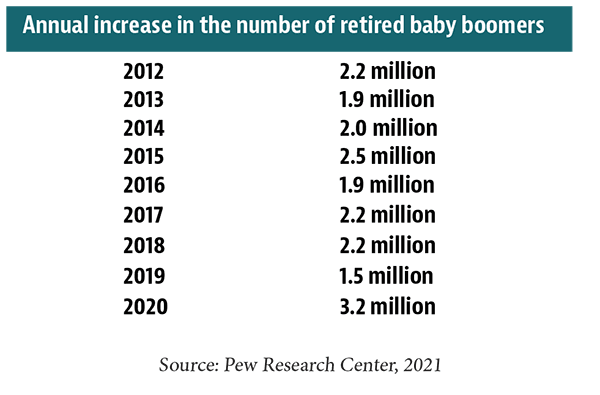
According to a March 2021 survey, an estimated 2.8 million Americans ages 55 and older decided to file for Social Security benefits earlier than they expected because of Covid-19. This was about double the 1.4 million people in the same age group who said they expected to work longer, presumably due to pandemic-related financial losses.1
Many older workers were pushed into retirement after losing their jobs, and others may have had health concerns. Still, it appears that work-related stress and the emotional toll of the pandemic caused a lot of people to rethink their priorities and their retirement timelines.
How do you know if you can realistically afford to retire early? First and foremost, determine whether you will have enough income to support the lifestyle you envision. Instead of accumulating assets, you may have to start draining your life savings to cover living expenses. Here are four important factors to consider.
Lost Income and Savings
You may be sacrificing years of future earnings and contributions to your retirement accounts. For example, an early retiree who was making $80,000 per year would forgo about $400,000 of salary over five years or $800,000 over a decade, not counting cost-of-living or merit increases.

The 10-year total rises to nearly $1 million when annual raises averaging just 3% are included.
If the same retiree could have contributed 5% of salary to an employer-sponsored retirement plan with a 100% match, he or she would also miss out on $8,000 in combined contributions in the first year, more than $40,000 over five years, and almost $100,000 over 10 years.
Debt and Other Financial Responsibilities
If you are still paying a mortgage, have other debts, of are supporting children or aging parents, you may not be ready to retire. Ideally, you should be free of "extra" financial responsibilities so you can focus on meeting your own living expenses without a regular paycheck.
Reduced Social Security Benefits
The earliest age you can file for Social Security is 62, but your benefit would be reduced to 70% or 75% of your full retirement benefit — for the rest of your life. So even if you do decide to retire, you might think about waiting to claim your benefit until you reach full retirement age (66 or 67, depending on the year you were born) or longer if you have enough income and/or savings to cover your expenses. For every year you wait, past your full retirement age, your benefits will increase by 8% (up to age 70). 2
Higher Medical Costs
If you retire before you (or a spouse) become eligible for Medicare at age 65, you could lose access to an affordable employer-provided health plan. You can purchase health insurance through the Health Insurance Marketplace or a broker, but the age-based premiums are more expensive for older applicants. For two 60-year-olds with a household income of $100,000, the average premium for a silver Marketplace plan in 2021 is $708 per month ($8,500 per year), after subsidies. And if you seek medical treatment, you'll typically need to cover copays, deductibles, coinsurance, and some other expenses (up to the plan's out-of-pocket maximum).3
Even with Medicare, it's estimated that a married couple who retired at age 65 in 2020, with median expenses for prescription drugs, would need $270,000 to have a 90% chance of paying their health-care costs throughout retirement.2
The bottom line is that some people might be giving up more than they realize when they retire early. Before you say goodbye to the working world, be sure you have the resources to carry you through the next phase of your life.
1) https://www.census.gov/data/experimental-data-products/household-pulse-survey.html
2) https://www.ebri.org/docs/default-source/fast-facts/ff-356-savingstargets-25jun20.pdf?sfvrsn=4d873d2f_4
3) https://www.kff.org/health-reform/issue-brief/impact-of-key-provisions-of-the-american-rescue-plan-act-of-2021-covid-19-relief-on-marketplace-premiums/
This information is not intended as tax, legal, investment, or retirement advice or recommendations, and it may not be relied on for the purpose of avoiding any federal tax penalties. You are encouraged to seek advice from an independent professional advisor. The content is derived from sources believed to be accurate. Neither the information presented nor any opinion expressed constitutes a solicitation for the purchase or sale of any security. This material was written and prepared by Broadridge Advisor Solutions. © 2019 Broadridge Investor Communication Solutions, Inc.
Advisory services are offered through Buska Wealth Management, LLC, a Registered Investment Advisor in the state of Wisconsin. Insurance products and services are offered through Buska Retirement Solutions, Inc., an affiliated company. Buska Retirement Solutions, Inc. and Buska Wealth Management, LLC are not affiliated or endorsed by the Social Security Administration or any government agency.
All written content is for information purposes only. It is not intended to provide any tax or legal advice or provide the basis for any financial decisions.
The information contained herein is not an offer to sell or a solicitation of an offer to buy the securities, products or services mentioned, and no offers or sales will be made in jurisdictions in which the offer or sale of these securities, products or services is not qualified or otherwise exempt from regulation.
The information contained in this material have been derived from sources believed to be reliable, but is not guaranteed as to accuracy and completeness and does not purport to be a complete analysis of the materials discussed.
Office Hours
Monday
8:00am - 5:00pm
Tuesday
8:00am - 5:00pm
Wednesday
8:00am - 5:00pm
Thursday
8:00am - 5:00pm
Friday
9:00am - 12:00pm
Buska Retirement Solutions
510 N 17th Ave Suite A
Wausau, WI 54401
Phone: (715) 355-4445
Fax: (715) 355-4445

